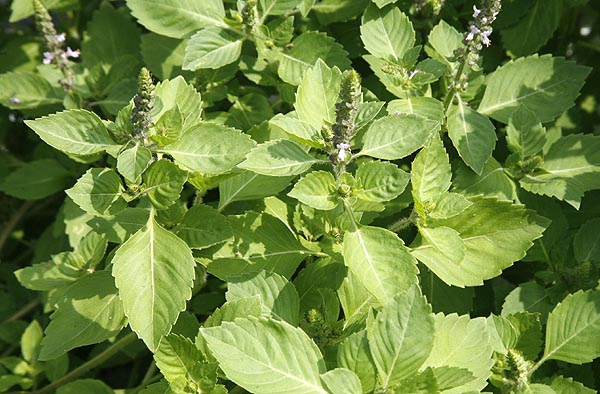Holy Basil (Ocimum tenuiflorum): The Sacred Herb of Health and Wellness
Holy Basil, also known as Tulsi or Ocimum tenuiflorum, is a revered herb in Ayurvedic medicine and has been used for centuries due to its numerous health benefits. Considered a sacred plant in Hindu culture, Holy Basil holds a significant place in traditional practices and is regarded as a symbol of purity and divine protection. In this article, we will explore the fascinating world of Holy Basil, examining its history, botanical features, traditional uses, and potential health benefits.
History and Botanical Features:
Holy Basil is native to the Indian subcontinent and Southeast Asia, where it has been cultivated and cherished for over 3,000 years. The herb holds immense cultural and religious significance, and its Sanskrit name "Tulsi" means "the incomparable one."
Botanically, Holy Basil belongs to the Lamiaceae family and is a close relative of the common culinary basil (Ocimum basilicum). It is an aromatic perennial plant with green leaves that have a slightly spicy and clove-like fragrance. The plant can grow up to two feet tall and produces small, delicate flowers that can range in color from white to purple.
Traditional Uses:
In Ayurvedic medicine, Holy Basil is considered one of the most sacred and revered herbs, with a wide range of traditional uses. Here are some of its notable applications:
1. Adaptogenic Herb: Holy Basil is classified as an adaptogen, meaning it helps the body adapt to physical, mental, and emotional stress. It is believed to support the body's natural stress response, promoting resilience and overall well-being.
2. Immune Support: Holy Basil is renowned for its immune-supportive properties. It is believed to enhance the body's natural defense mechanisms, helping to strengthen the immune system and protect against infections.
3. Respiratory Health: Holy Basil has a long history of use for respiratory conditions. It is often used to relieve coughs, colds, and flu symptoms. The herb is believed to have expectorant properties, helping to expel mucus and alleviate congestion.
4. Digestive Aid: Holy Basil is known to support digestive health. It is believed to help relieve digestive discomfort, reduce gas and bloating, and improve overall digestion. The herb is often used as a digestive tonic and can help soothe gastrointestinal inflammation.
5. Mental Wellness: Holy Basil is revered for its calming and balancing effects on the mind. It is used to promote mental clarity, reduce anxiety and stress, and support emotional well-being. Holy Basil is believed to have a positive impact on mood, promoting a sense of calm and relaxation.
Potential Health Benefits:
1. Stress Reduction: Holy Basil is widely recognized for its adaptogenic properties and its ability to support the body's response to stress. Research suggests that Holy Basil may help reduce stress-related symptoms, such as anxiety and fatigue, and promote a sense of calm and relaxation.
2. Immune System Support: Holy Basil is rich in antioxidants and has immune-modulating properties. It is believed to enhance the activity of immune cells, improving the body's defense against infections and supporting overall immune system health.
3. Anti-Inflammatory Effects: Holy Basil contains compounds that possess anti-inflammatory properties. It may help reduce inflammation in the body, supporting joint health and relieving symptoms associated with inflammatory conditions.
4. Respiratory Health Support: Holy Basil has been traditionally used for respiratory conditions such as coughs, colds, and asthma. It is believed to have expectorant and bronchodilatory properties, helping to alleviate respiratory symptoms and support lung health.
5. Antimicrobial Activity: Holy Basil exhibits antimicrobial properties and may help inhibit the growth of certain bacteria, viruses, and fungi. It is believed to have a broad spectrum of antimicrobial activity, making it potentially beneficial for preventing and treating various infections.
6. Cognitive Function: Holy Basil is believed to have neuroprotective properties and may support cognitive function and memory. Research suggests that it may help improve cognitive performance and protect against age-related cognitive decline.
7. Cardiovascular Health: Holy Basil is thought to have cardioprotective effects. It may help regulate blood pressure, reduce cholesterol levels, and improve overall cardiovascular health. Some studies suggest that Holy Basil may help prevent the formation of blood clots and reduce the risk of heart disease.
Safety Considerations:
Holy Basil is generally safe for most people when consumed in moderate amounts as a food or tea. However, it is important to note the following considerations:
1. Pregnancy and Breastfeeding: Holy Basil should be used with caution during pregnancy and breastfeeding. It is advisable to consult a healthcare professional before using Holy Basil in these stages.
2. Medications and Existing Conditions: If you have any underlying health conditions or are taking medications, it is advisable to consult with a healthcare professional before using Holy Basil to ensure it does not interact with any medications or worsen your condition.
Conclusion:
Holy Basil, or Tulsi, is a revered herb with a rich history and a wide range of potential health benefits. Its adaptogenic properties, immune-supportive effects, respiratory health benefits, and positive impact on mental well-being make it a valuable addition to natural health practices. However, it is important to use Holy Basil responsibly and consult with a healthcare professional, especially if you have any underlying health conditions or are taking medications. Embrace the wisdom of this sacred herb and explore the potential benefits it may offer in your journey towards holistic well-being.





0 Comments